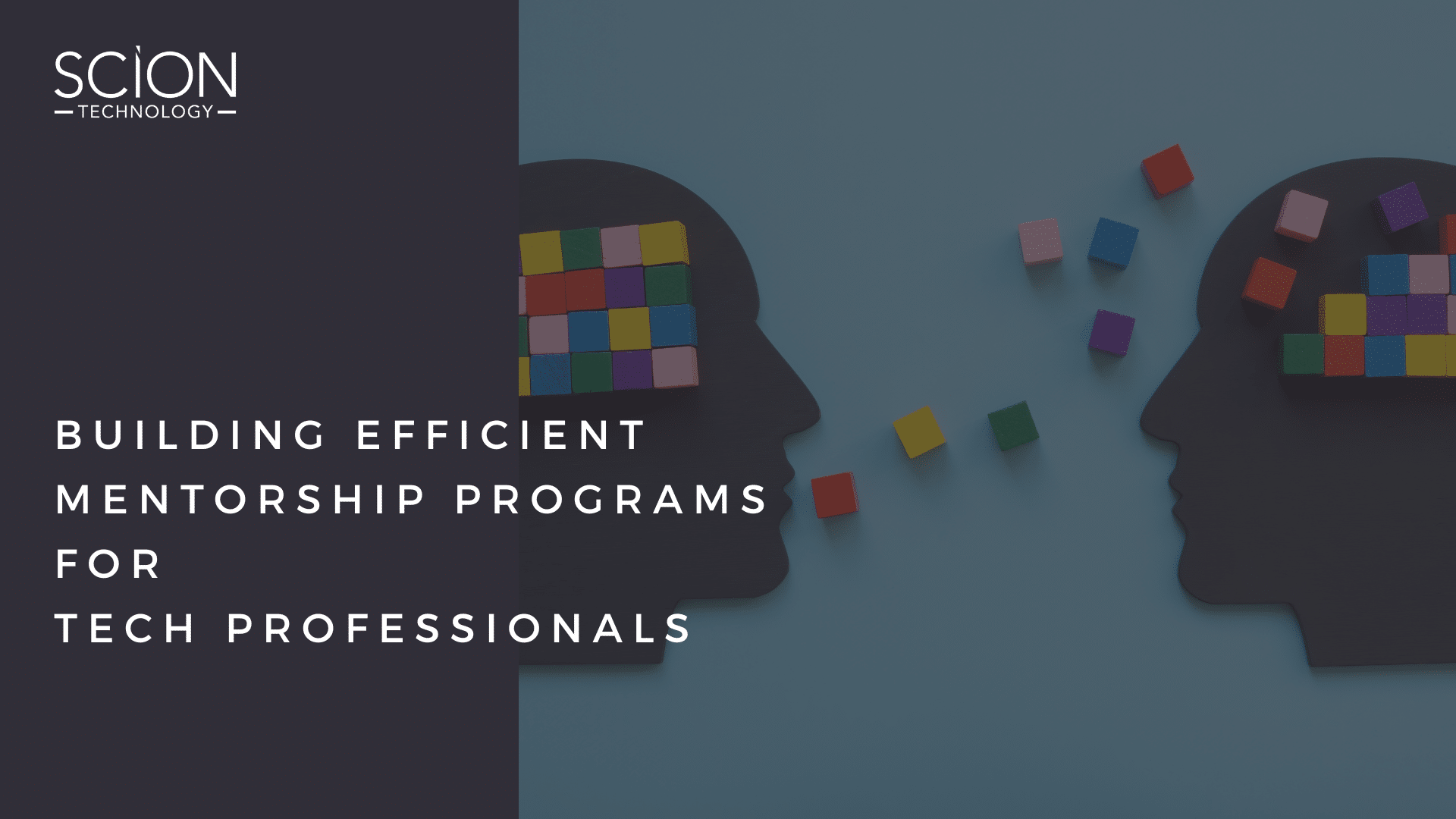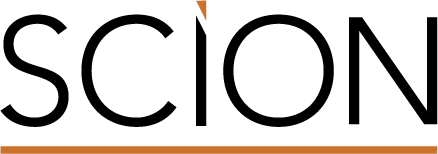
20 Feb Building Efficient Mentorship Programs for Tech Professionals
https://sciontechnical.com/benefits-of-working-with-tech-startup/https://sciontechnical.com/negotiating-job-offers-tech-industry/In today’s rapidly evolving world of technology, keeping ahead of the curve demands more than just technical expertise or creative skills. Success is also rooted in cultivating talent and fostering meaningful relationships that support both personal and professional development. This is where mentorship programs play a pivotal role—offering guidance in the complex and dynamic tech industry.
However, creating a mentorship program that not only works but also resonates with tech professionals can be a challenge. It requires building an environment that encourages innovation and empowers careers to grow.
In this article from Scion Technology, we’ll explore the key benefits of mentorship, outline how to establish clear goals for your mentoring platform, discuss how to address common challenges, and provide strategies for developing an effective and impactful mentorship program tailored to your tech professionals.
What is Mentorship?
Mentorship in the tech industry goes beyond simple advice or casual coffee chats. It’s a dynamic relationship that serves as the keystone to unlocking potential, both for mentors and mentees. Picture this: a seasoned developer guiding a newbie through the labyrinth of tech stacks, or a visionary leader sharing insights on the latest tech industry trends. The impact is profound, shaping careers and driving innovation in a competitive market where skill acquisition is becoming an important aspect of development.
The Importance of Mentorship in the Tech Industry
- For Tech Professionals: Mentorship opens doors to tech career advancement, offering personalized guidance tailored to individual goals.
- For Organizations: It acts as a catalyst for knowledge sharing, nurturing a culture of continuous learning and adaptation.
Benefits of Mentoring
- For Mentors: Enhance their leadership prowess and communication finesse. Gain fresh perspectives that challenge and inspire.
- For Mentees: Accelerate skill development and gain confidence in their career path. Build a robust professional network that opens doors to new opportunities.
Challenges in Mentorship Programs
While the benefits are clear, creating a thriving mentorship program isn’t always smooth sailing. From aligning expectations to maintaining active engagement, the hurdles are real. But with the right strategies, these challenges can be transformed into opportunities for growth.
Defining Your Mentorship Program Goals
Setting clear and focused goals is the foundation of an effective mentorship program. It’s about aligning with organizational visions while paving a path for individual success. Think of it as mapping out the journey before hitting the road—having precise goals ensures that every step taken leads towards meaningful outcomes.
Identify Specific Goals and Objectives
- Career Development: Foster growth through structured tech career development initiatives.
- Knowledge Sharing: Encourage the transfer and application of skills and industry insights.
- DEI Initiatives: Embrace diversity, equity, and inclusion to enrich the learning environment.
Key Considerations
Be sure to evaluate how the goals of your program align with broader organizational objectives and current tech industry trends. Ensure that objectives are not just ambitious but also realistic and measurable.
Selecting the Right Mentors
The choice of mentors can make or break your mentorship program. It’s about more than just expertise or assigning a mentee to a senior employee; it’s about empathy, passion, and the ability to inspire. Selecting mentors who embody these qualities ensures a nurturing environment where mentorship best practices are lived and shared.
Qualities of Effective Mentors
An effective mentor has exceptional communication, interpersonal, and leadership skills. They will have a depth of experience in the tech field and familiarity with effective mentoring strategies to help mentees reach their career goals.
Different Mentoring Approaches
- Formal Mentoring: Structured interactions that provide a clear framework and regular touchpoints.
- Informal Mentoring: Organic, flexible, and meaningful relationships that evolve naturally.
- Reverse Mentoring: A fresh take where junior employees provide insights and guidance to senior colleagues.
Challenges in Selecting Mentors
Finding mentors who are both qualified and genuinely invested can be a challenge. Cultural and generational gaps add another layer of complexity, but with careful planning, these challenges can be addressed effectively.
Matching Mentors and Mentees
The art of pairing the right mentor with the right mentee is crucial. It’s like matching puzzle pieces where alignment leads to the creation of a bigger, more beautiful picture. This process requires thoughtful consideration to ensure that the connections foster growth and mutual satisfaction.
Matching Methods
- Self-Matching: Empowering mentees to choose allows for a sense of autonomy and personal connection.
- Program-Matching: Coordinators carefully align mentors and mentees based on skills and interests for optimal synergy.
Considerations for Matching
When making your considerations for matching mentors with mentees, be sure to assess experience, interests, and career development goals to ensure compatibility for personal development. In order to build strong mentoring programs, facilitate balanced mentor-mentee relationships that are poised for productive collaboration.
Challenges in Matching
Mismatches can lead to frustration and disengagement, so it’s essential to get it right from the start. With the right tools and strategies, potential hurdles can be navigated smoothly.
Creating Structured Mentorship Programs
A well-structured mentorship program is like a well-oiled machine—every component must work in harmony. Structure brings clarity, setting the stage for meaningful interactions and tangible outcomes. It’s about creating a roadmap that guides participants through their mentorship journey.
Key Components of Strong Mentorship Programs
- Orientation: Introduce participants to program goals, expectations, and resources.
- Regular Meetings: Establish consistent and purposeful interactions.
- Evaluation: Implement feedback mechanisms to track progress and adjust strategies as needed.
Setting Clear Expectations and Guidelines
To foster a productive and successful mentoring relationship, it’s essential to establish clear expectations and guidelines. This includes defining roles and responsibilities, establishing communication guidelines, setting goals and objectives, creating a code of conduct, and providing a feedback mechanism.
Clarify the mentee’s role in actively seeking guidance, participating in the mentorship relationship, and setting goals. This might include preparing for meetings, being open to feedback, sharing updates, and taking initiative.
Establishing Communication Guidelines
Determine meeting frequency, decide on preferred communication methods, and set expectations for how quickly mentors and mentees should respond.
Setting Goals and Objectives
Encourage both mentors and mentees to set SMART goals. Consider establishing shared goals that align with the overall objectives of the mentoring program.
Creating a Code of Conduct
Emphasize the importance of mutual respect and professionalism, establish guidelines for maintaining confidentiality, and outline procedures for addressing any conflicts that may arise.
Providing a Feedback Mechanism
Encourage both mentors and mentees to provide constructive feedback and consider offering an anonymous feedback option.
By setting clear expectations and guidelines, you can create a structured and productive mentoring environment that fosters growth, development, and a positive relationship between mentors and mentees.
Exploring Different Mentoring Formats
- In-person: Traditional face-to-face engagements that build rapport.
- Hybrid: A blend of physical and digital interactions for flexibility.
- Remote: Leveraging virtual tools to connect across the country and beyond.
Providing Support and Resources
The success of mentorship programs hinges on continuous support and accessible resources. It’s about equipping both mentors and mentees with the tools they need to thrive. By providing ongoing support, organizations ensure that these relationships are fruitful and fulfilling.
Ongoing Support
Offer continuous guidance and establish feedback loops to ensure growth. Provide training sessions and resources to address evolving needs, as well as professional development.
Tools and Technologies
Utilize digital platforms as a valuable tool to enhance communication and resource sharing. Implement technologies like mentoring software that tracks mentorship effectiveness and facilitates adjustments.
Challenges in Providing Support
Balancing technological access with personal interaction can be challenging, but it’s essential for maintaining engagement and satisfaction within mentorship programs.
Measuring the Effectiveness of Your Mentorship Programs
Measuring the impact of mentorship programs is not just about ticking boxes. It’s about understanding what works and what doesn’t. By focusing on key metrics, organizations can evaluate the success of their initiatives and make informed adjustments for the future.
Key Metrics to Track
It can be a powerful tool to keep track of key metrics throughout the mentor program. Monitor mentees’ career advancement and skill development. Evaluate mentor satisfaction and engagement to ensure a thriving program.
Evaluation Methods
Conduct surveys and feedback sessions to gather insights on the progress of the program, as well as mentor relationships with their mentees. Track career progression and performance improvements as tangible outcomes.
Challenges in Measurement
Quantifying the qualitative aspects of mentor-mentee relationships can be elusive. However, with a strategic approach, these challenges can be overcome to paint a clear picture of program effectiveness.
Overcoming Common Challenges in Mentorship Programs
Every mentorship program faces obstacles along the way, but with a proactive approach, these challenges can be transformed into opportunities for growth and improvement.
Common Challenges
- Time Commitment: Balancing busy schedules with mentorship activities.
- Lack of Engagement: Motivating participants who may lose interest over time.
- Cultural Differences: Navigating and bridging gaps between diverse backgrounds.
Strategies for Overcoming Challenges
- Cultivate a culture of commitment and accountability: Reinforce the importance of regular participation and timely responses from both mentors and mentees. Implement systems to track attendance, engagement, and progress, and address any issues promptly. Acknowledge and reward participants for their commitment and contributions to the program.
- Encourage open communication and adapt to feedback: Foster an environment where mentors and mentees feel comfortable sharing their thoughts, concerns, and experiences. Encourage both parties to listen attentively and respond thoughtfully to each other’s feedback. Be willing to adjust the program’s structure or approach based on feedback and evolving needs such as learning styles and organizational goals.
- Promote cultural awareness and sensitivity training: Emphasize the importance of diversity, equity, and inclusion in the mentoring program. Provide training to mentors and mentees on cultural awareness, sensitivity, and effective communication across different backgrounds. Organize activities and discussions that promote cross-cultural understanding and collaboration.
- Address time constraints: Help participants manage their time effectively by scheduling meetings at convenient times and providing flexible options. Utilize technology to facilitate virtual mentoring sessions, allowing participants to connect from anywhere. Offer tips and resources on time management techniques to help participants balance their professional and personal commitments.
- Manage expectations: Help mentors and mentees set realistic goals that align with their capabilities and time commitments. Maintain open communication to address any concerns or misunderstandings that may arise. Be prepared to adjust expectations as needed to ensure the program remains sustainable and beneficial for all participants.
By implementing these strategies, you can address common challenges and create thriving mentorship programs that fosters growth, development, and positive outcomes for both mentors and mentees. Successful mentoring programs can help you create impactful mentoring relationships, improve retention rates, and continue growth for your organization.
Scion Technology: Find Talented Tech Candidates
Mentorship programs are a vital component of tech career development, providing the foundation for career advancement and personal growth. By embracing effective mentoring strategies and addressing challenges head-on, organizations can create an environment where innovation thrives and individuals flourish.
At Scion Technology, we’re committed to supporting your journey by connecting you with qualified tech candidates. Our award-winning tech recruitment services provide access to exceptional talent across a wide array of tech fields. Together, let’s empower the next generation of tech leaders and drive your organization to new heights! Get in touch with our tech staffing and recruiting specialists today!
About the Author
Patrick Chiotti (he/him) is an accomplished SEO writer and is currently the Marketing and Communications Specialist at Scion Staffing, bringing years of experience in SEO knowledge and a passion for writing to the Scion team. With additional experience in customer service roles, retail, and accounting, Patrick brings a unique set of knowledge and skills to his role while sharing the passion to continue learning about a wide range of topics so he can share his voice to a larger audience. Outside of Scion, Patrick spends his time as a football coach at the high school level and is passionate about teaching the game, while remaining a student to it. He is also a husband and father, and enjoys fitness, as well as a passion for cooking amazing food.
OTHER QUICK READS
Navigating the “What Ifs”: A Guide for Tech Employers Preparing for Tomorrow’s Tech Talent


